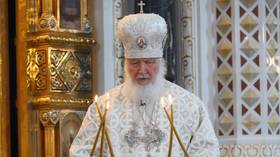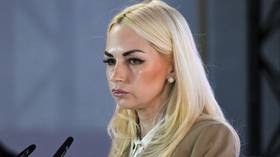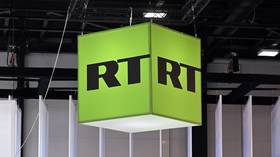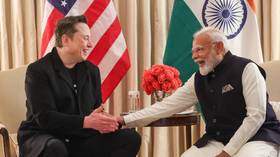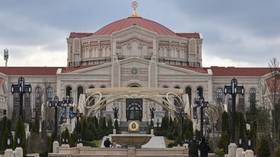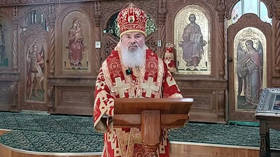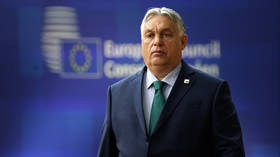The Sphinx of Europe: Unpredictable & widely misunderstood in the West, what happens next in crisis-hit Belarus is anyone’s guess
In recent months, Belarus’ seemingly eternal president, Alexander Lukashenko, has developed a passion for trips to Russia. Faced with a political crisis at home, he made his fourth visit of 2021 to his country’s closest ally.
Naturally, his meetings with Russian President Vladimir Putin prompt widespread commentary and speculation each time. Beyond important details, such as gas prices or credits, understanding these trips depends, in essence, on three main points.
First, and most obviously, is the relationship between the two countries. Belarus is clearly becoming more dependent on Russia, and Lukashenko on Putin. This much was made clear when Moscow stood steadfastly behind Minsk in the face of international outcry over the grounding of a Ryanair flight and the arrest of two of its passengers last month.
Second, the relationship between Belarus and the West (i.e. mostly the USA and the EU) is clearly fractious, with sanctions being deployed against the country, both before and after the Ryanair incident.
Also on rt.com Lithuania calls on EU to impose sanctions against Belarus over illegal migrants as Brussels launches urgent border operationAnd third, despite sometimes fading into the background, is the future of the smoldering political crisis that began with Belarus’ brutal response to the protests in the wake of last summer’s elections. This question cuts to the heart of Lukashenko’s future – or, potentially, his lack of one.
Beyond the minutiae of the Belarusian leader’s regular trips, it is worth considering his country’s prospects systematically. Minsk and its politics somehow have a way of bringing out the best and worst of people and governments.
Among the best is the persistence of those Belarusians, at home, resisting Lukashenko’s escalating authoritarianism, non-violently and often at a steep price in terms of retaliation, from losing jobs to being imprisoned and the risk of suffering severe abuse.
Make no mistake, these repressions are not restricted to elite politicians and prominent activists with fluent English, many of them safely abroad, who are confident in their command of the ‘civil society’ jargon so beloved by Western media.
The heavy hand of Lukashenko’s security forces – or ‘siloviki’ – also falls on Belarusians who receive much less attention in the West, across the social spectrum, including workers, nurses and doctors, and local artists and journalists.
Any observer reducing the struggles and sacrifices of these not-so-“ordinary” Belarusians to “outside agitation” by the West or the “Western infowar” is not only deeply unfair, but also commits a basic fallacy: The West does practice geopolitics and dirty tricks. But that makes no difference to the fact that there is genuine domestic resistance to Lukashenko’s exploitative and corrupt regime.
When it comes to the worst that Belarus brings out, EU member Lithuania’s inhumane new attack on migrants crossing the Belarusian border certainly makes the cut. Legislation bolstering mass detention and deportation while laying waste to rights of appeal is shameful.
But Lithuanian leaders add insult to injury by caricaturing human beings in desperate flight – often from wars waged by the West in the Middle East – as “not real migrants” and nothing but a tool to be used by Lukashenko. It is as if Lithuania’s government has set out to provide a textbook example of the brutal cynicism and low populism behind the nasty narrative of “weaponized” refugees.
Lukashenko’s regime itself is, of course, also relentlessly adding to the showcase of the worst. Cracking down on former presidential challenger Viktor Babariko (once considered Russia’s preferred candidate by some) with an absurd lengthy prison sentence, shuttering and driving out critical media, such as Nasha Niva, and hunting down remaining activists.
Among outsiders, again, there also is a general bad habit – not so much among experts, but among Western politicians and in media coverage – that blights thinking about Belarus: sketchy analysis and over-confident prediction. That is ironic, because developments in Belarus are, if anything, especially hard to unravel and predict. In fact, Belarus’ trajectory since independence in 1991 is marked by its strange and unexpected path.
The Belarusian government has adopted an authoritarian stance, and its population of about 10 million is comparatively small. Yet it also has a dynamic society that increasingly demands change and has produced one of the most broad and persistent – if currently stymied – challenges to authoritarianism in the post-Soviet space.
Also on rt.com Lithuania declares emergency, appeals to EU over ‘flood’ of Iraqi migrants from BelarusThen again, neighboring Ukraine has had six presidents since independence; only one achieved re-election, and the office has changed hands twice through street uprisings. Belarus has had one man in the top job, Lukashenko, who has been in power since 1994 and shows no signs of leaving any time soon.
So, one conclusion is that Belarus’ regime is, in theory, “stable” but, in reality, potentially not.
Internationally, Belarus has leaned east, then west, and now east once again. Yet it has never been an easy or reliable partner or client for anyone, neither the EU nor Russia, notwithstanding that it is formally tied into a special yet largely unimplemented “union state” relationship with Moscow.
Indeed, dealing with Lukashenko means wrestling with a politician who seems clinically averse to rules and agreements, at least in the way most other people – and even other politicians – understand these terms. His compliance lasts as long as it is to his advantage, and not a second longer. And that is a fact everyone who has had run-ins with him is aware of, whether in Moscow, Berlin or Washington.
What is even more remarkable – and perhaps surprising for Western observers – is the fact that the resistance to Lukashenko’s regime has not featured a clear geopolitical orientation either, at least initially. Not for Belarusians, it seems, to be easily mobilized for the grand and hollow “civilizational” choices some Western public intellectuals cannot stop droning on about.
Another conclusion the situation exposes is that if Belarus’ current leader is opportunistic to a fault, his subjects are pragmatists, largely disinclined to buy into ideological fluff, be it nationalism or “frontier of Western civilization” baloney.
And that brings us back to the question of Belarus’s ongoing political crisis. It is possible that Lukashenko will continue to go ahead with his controversial idea of constitutional reform, very much shaped by him and without substantial input from his opponents.
But it is impossible to predict what the result would be. Could it open a way to a negotiated exit for him? Could it provoke a new wave of acute mobilization among his opponents? Or – a real possibility as well – could it fail to make much of a difference? And what would any of this mean for Belarus’ international position? One thing seems certain: most predictions will turn out wrong.
Like this story? Share it with a friend!
The statements, views and opinions expressed in this column are solely those of the author and do not necessarily represent those of RT.
The statements, views and opinions expressed in this column are solely those of the author and do not necessarily represent those of RT.




